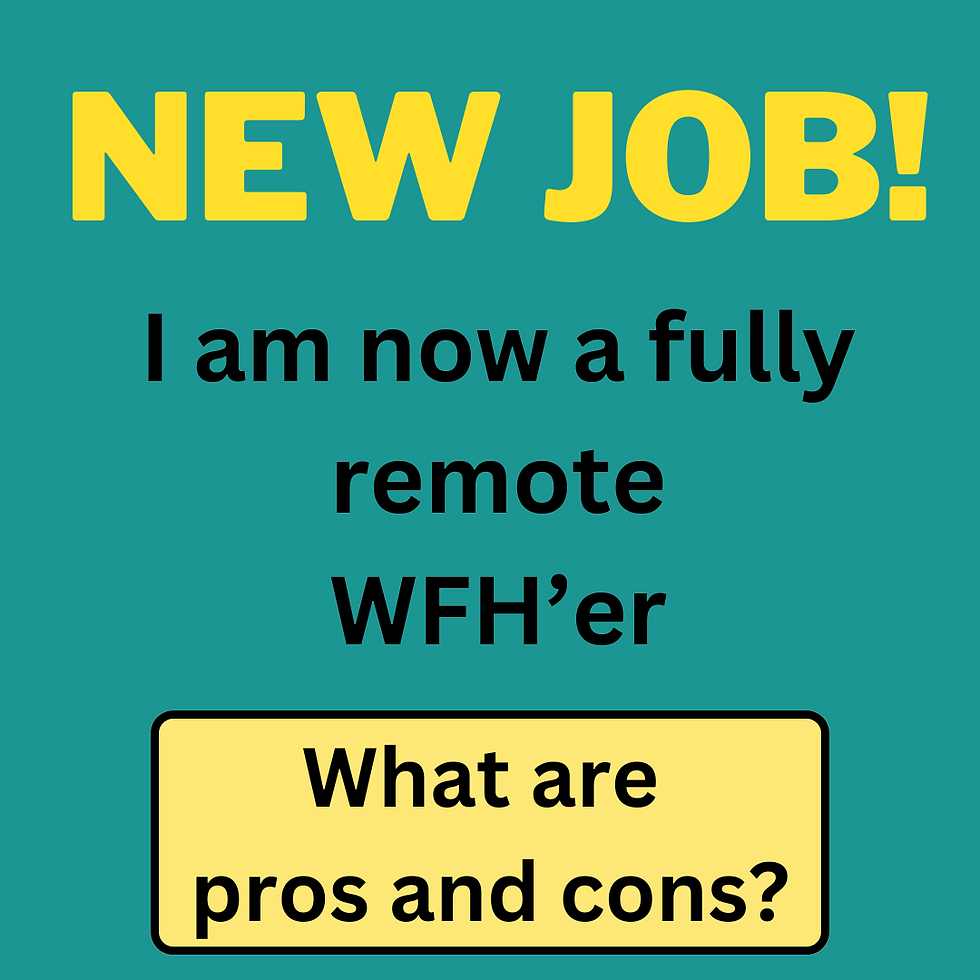Embracing Change: Transitioning from Hospital Office to Fully Remote Work
Change is inevitable, and sometimes it comes in unexpected forms. For me, that change arrived in the guise of a career shift from working in a bustling hospital office to embracing the flexibility of a fully remote job. The transition, though daunting at first, has been both enlightening and transformative.
In this blog, I'll delve into the pros and cons of this shift and how it has shaped my professional journey.
Pros of Fully Remote Work:
Flexibility: I am obviously still bound but the general workday timings and what meetings go on. But I generally have more flexibility when I do certain tasks, and for the rest of my diary have autonomy of when I do things. Plus I am not roped into things because people can simply see I am there.
Improved Work-Life Balance: Gone are the days of long commutes and rushing to make it to the office on time. Remote work allows me to reclaim those precious hours spent in transit and allocate them to pursuits that nurture my well-being. Whether it's spending more time with family, pursuing hobbies, or simply enjoying moments of tranquility, remote work has helped restore balance to my life.
Increased Productivity: Surprisingly, working from the comfort of my home has led to a boost in productivity. Minimided distractions and the ability to customize my workspace to suit my preferences have allowed me to focus more intently on tasks at hand. Additionally, the absence of office chatter and impromptu meetings has enabled me to accomplish more in less time.
Cost Savings: Bid farewell to daily expenditures on fuel, parking fees, and work attire. Remote work translates to significant cost savings, sparing me from the financial burden associated with commuting and maintaining a professional wardrobe. Moreover, with the rise of remote collaboration tools, expenses related to office supplies and equipment have dwindled.
Micro breaks: Getting the odd bit of housework, dinner prep or other life admin done during work time is such a win. It means I am getting paid to do boring life jobs, and means my time outside of work is less busy with these mundane tasks.

Cons of Fully Remote Work:
Lack of Face-to-Face Interaction: While technology has bridged the gap in communication, nothing quite compares to face-to-face interaction. The absence of in-person meetings and casual office banter can sometimes lead to feelings of isolation and detachment from colleagues. Building and maintaining meaningful relationships in a virtual setting requires concerted effort and creativity.
Blurred Boundaries: One of the pitfalls of remote work is the tendency for boundaries between work and personal life to blur. With the office just a few steps away, it can be tempting to check emails or tackle tasks outside of designated work hours. Setting clear boundaries and establishing a dedicated workspace are crucial in maintaining a healthy work-life balance.
Tech Challenges: While technology serves as the backbone of remote work, it's not without its challenges. Connectivity issues, software glitches, and compatibility issues can occasionally disrupt workflow and cause frustration. Navigating these tech hurdles requires patience, adaptability, and a willingness to seek assistance when needed.
Potential for Distractions: Working from home presents a myriad of distractions, from household chores to the allure of Netflix binges. Staying disciplined and adhering to a structured work schedule is essential in warding off these distractions and maintaining productivity.

Embracing remote work brings undeniable financial perks. By eliminating daily commutes, employees save significantly on transportation costs, whether it's fuel expenses, public transit fares, or parking fees. Moreover, the absence of a daily trip to the office translates into savings on professional attire and grooming expenses. Working from home also slashes spending on dining out for lunch and snacks, as employees have the convenience of preparing meals at home. Additionally, remote workers may qualify for home office tax deductions, further bolstering their financial bottom line. In sum, the financial benefits of remote work offer both immediate relief and long-term savings opportunities
In summary, transitioning from an office in a hospital to a fully remote job has been a journey filled with both rewards and challenges. While the flexibility and autonomy of remote work have empowered me to thrive professionally and personally, it's essential to acknowledge and navigate the potential pitfalls that accompany this lifestyle. By leveraging the advantages of remote work while proactively addressing its challenges, I've embraced this change wholeheartedly and I look forward to the next few months, especially seeing the change in spending!


Comments